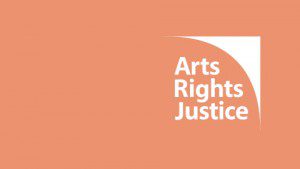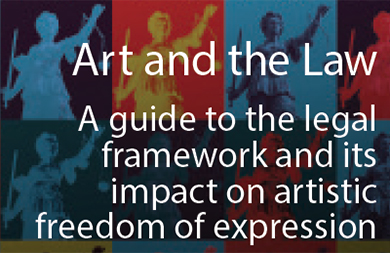18 Mar 2016 | Greece, mobile, News
Stills by Belgian artist Kris Verdonck, from A Two Dogs Company on Vimeo.
“My job is to make good art,” said Belgian artist Kris Verdonck. “I have no interest in being deliberately offensive or provocative.”
Verdonck was speaking at an event at the Onassis Cultural Centre in Athens last week, entitled Art Freedom Censorship. Featuring a range of international speakers and organisations, including Index on Censorship, the event was inspired by recent works and performances that have been shutdown in Greece following public outcry.
In Verdonck’s case, that outcry came predominantly from one man: a local priest.
Last year Onassis Cultural Centre put on one of Verdonck’s works, Stills, a series of oversized, slow-mo nudes that move within confined spaces. The artist has been showing the images around Europe, projected on to buildings associated with historical dictators. In Athens, the show lasted just one day before a priest complained. A staff member from Onassis was temporarily held in police custody before the centre agreed to halt the projections.
Also speaking at Art Freedom Censorship was director Pigi Dimitrakopoulou, who presented a play, Nash’s Balance, at Greece’s National Theatre in January, before it was pulled mid-run after vehement protests and threats of violence. The work used text taken from a book by Savvas Xiros, a convicted member of the 17 November group, which the Greek government considers a terrorist organisation.
In one of the more heated debates of the evening, Dimitrakopoulou said she hadn’t given much thought to censorship before being embroiled in the scandal. “I always thought I was too conservative to be affected by such things.” She spoke of a “political tsunami” that engulfed the show. “I expected a reaction, but more related to the work,” she said, adding that she believed most critics hadn’t seen it.
Greek journalist and publisher Elias Kanellis, who had been outspokenly against the decision to use the 17 November text, stood by his criticism but clarified that he never called for it to be censored. “Criticism is the founding principle of democracy,” he said. “But what if I were to publish Jihadi propaganda?”
Discussions also included a look at the role of the church in Greece today. Stavros Zoumboulakis, president of the supervisory council of the Greek National Library, spoke of orthodox priests refusing to admit the nation is now a post-Christian society, with only a tiny percentage attending mass. But Xenia Kounalaki, a journalist from Greek daily newspaper Kathimerini, argued the issue was less about numbers of active worshipers, more a problem of top-down influence, which still extends into the nation’s education system.
Other speakers included former Charlie Hebdo columnist and author of In Praise of Blasphemy Caroline Fourest; Mauritanian filmmaker Lemine Ould M. Salem, who has run into difficulties with France’s film classification board over his documentary about Salafi fighters in Mali; and German director Daniel Wetzel, who is presenting a theatrical interpretation of Mein Kampf at Onassis in April.
Vicky Baker spoke at Art Freedom Censorship on behalf of Index on Censorship
17 Aug 2015 | Campaigns, Statements
The following letter was published in The Times.
Sir, The abrupt cancellation of the National Youth Theatre’s production of Homegrown is a troubling moment for British theatre and freedom of expression. The play seeks to examine radicalisation and disaffection among British youth. Its cancellation serves only to shut down conversation on these important issues. We fear that government policy in response to extremism may be creating a culture of caution in the arts.
We are deeply concerned by reports that the NYT may have been put under external pressure to change the location and then cancel the production. Police, local authorities and arts organisations have a duty to respect and protect freedom of expression — even, and most especially, where they disagree with the message or find it controversial.We urge the NYT to give a full account of what led to the decision, and hope that a way can be found to stage it so that the young voices involved can be heard and the production can be judged on its merits.
Maureen Freely, president, English PEN
David Aaronovitch, chair, Index on Censorship
Jodie Ginsberg, chief executive, Index on Censorship
Jo Glanville, director, English PEN
Shami Chakrabarti, director, Liberty
Anish Kapoor, artist
Anneliese Davidsen, executive director, Unicorn Theatre
Christopher Haydon, artistic director, Gate Theatre
Sir David Hare, playwright
David Lan, artistic director, Young Vic
Gurpreet Kaur Bhatti, playwright
Heydon Prowse, actor
Jolyon Rubinstein, actor
Howard Brenton, playwright
Josie Rourke, artistic director, Donmar Warehouse
Lorne Campbell, artistic director, Northern Stage
Monica Ali, writer
Timberlake Wertenbake, playwright
Nell Leyshon, playwright
Nick Williams, executive director, Actors Touring Company
Ramin Gray, artistic director, Actors Touring Company
Sabrina Mahfouz, playwright
Sarah Frankcom, artistic director, Royal Exchange Theatre Manchester
Simon Callow, actor
Stella Odunlami, artist and performer
Related:
• The Times: Why was Homegrown cancelled?
• Index calls for transparency on Homegrown cancellation (13 August 2015)
• Creative team behind Homegrown “deeply shocked” by cancellation (13 August 2015)
• Cancellation of Homegrown is very worrying (5 August 2015)
24 Jul 2015 | About Index, Campaigns, mobile, Press Releases
• Fear of prosecution over free speech can force arts practitioners to self-censor
• “Art and the Law” packs offer guidance for controversial exhibitions
• Issues exposed by “Exhibit B” and “The City” shut down last year show need for guidance
Index on Censorship and advocacy group Vivarta, supported by law firms Bindmans, Clifford Chance and others, have launched a new set of guidelines to help UK artists, curators and exhibitors navigate the legal framework underpinning artistic freedom of expression.
“Art and the Law” information packs covering Child Protection, Counter Terrorism, Obscene Publications, Public Order and Race and Religion will be available to galleries and practitioners across the country.
“Free expression is crucial to the arts,” said Julia Farrington, who spearheaded the project. “But we have found that too often, artists and exhibitors are unsure of their rights under the law. Our Art and the Law guides will help them approach controversy with more confidence.”
“The police, prosecutors and courts have a duty to defend free speech, said Jodie Ginsberg, Index on Censorship Chief Executive. “But, as we have seen with cases such as Exhibit B and Behzti, police will go along with a ‘heckler’s veto’ and advise that artistic productions shut down when threatened with protest.”
The Barbican’s “Exhibit B”, a show replicating slavery-era “Human Zoo” exhibitions of African people featuring live actors, was shut down in September 2014 in the face of protesters who saw the piece as racist and exploitative.
“The Exhibit B closure demonstrates clearly the power the police have over decisions about art that offends,” said Farrington. “These packs set out to explain the powers of the police and the rights and responsibilities of arts organisations in this area.”
The Art and the Law Guides will be published on 24 July. PDFs of the law packs are available at indexoncensorship.org/artandoffence
For more info, contact Julia Farrington; [email protected] /
+44 (0) 790288365
16 Jul 2015 | Campaigns, mobile, Statements
 Index on Censorship is one of 21 members of the Arts Rights Justice network who have signed the following statement:
Index on Censorship is one of 21 members of the Arts Rights Justice network who have signed the following statement:
Two representations of a theatre performance entitled “b7al b7al”, 4 and 5 July 2015 in Tangiers, Morocco have been forbidden again following a similar incident in Rabat on 13 June. Although the organisers had fully respected all administrative procedures, they were informed on 4 July (15 minutes before the performance after all technical installations had been prepared and the actors were ready), that the performance couldn’t take place. The second representation the following day was also forbidden.
This ban takes place at a time when the migrant communities of the city of Tangiers are living violent, racist events that represent a complete denial of basic human rights and values.
The performance b7al b7al relieves tension and strengthens dialogue regarding migration between Morocco and Sub-Saharian Africa. It is regrettable that such a performance be forbidden. It offers a place for migrants from Sub-Saharian regions to express themselves, and to make the public aware of the problems they face. It also helps prevent stereotypes and prejudices linked to racism.
The public space should be accessible to cultural actors, artists and organisations representing civil society and should be free of constraints. It is here that art gets closer to citizens, allowing for debates to take place openly on highly relevant issues for society.
Public authorities’ role is to facilitate access and insure security of artists and citizens, respecting the freedom of artistic expression guaranteed by the Moroccan Constitution.
B7al b7al is part of Mix City, a project of Association Racines, in partnership with Theatre of the Oppressed in Casablanca and Minority Globe, also in collaboration with the association Visa Without Frontiers,Tangiers. Mix City is part of “Diversity, Drama and Development” co-funded by the European Commission in the framework of Medculture, also supported by the Prince Claus Fund for Culture and Development, the Swedish Foundation and the Heinrich Böll Foundation. It was set up by Minority Rights Group International, Civic Forum Institute and Andalus Institute.



 Index on Censorship is one of 21 members of the Arts Rights Justice network who have signed the following statement:
Index on Censorship is one of 21 members of the Arts Rights Justice network who have signed the following statement: